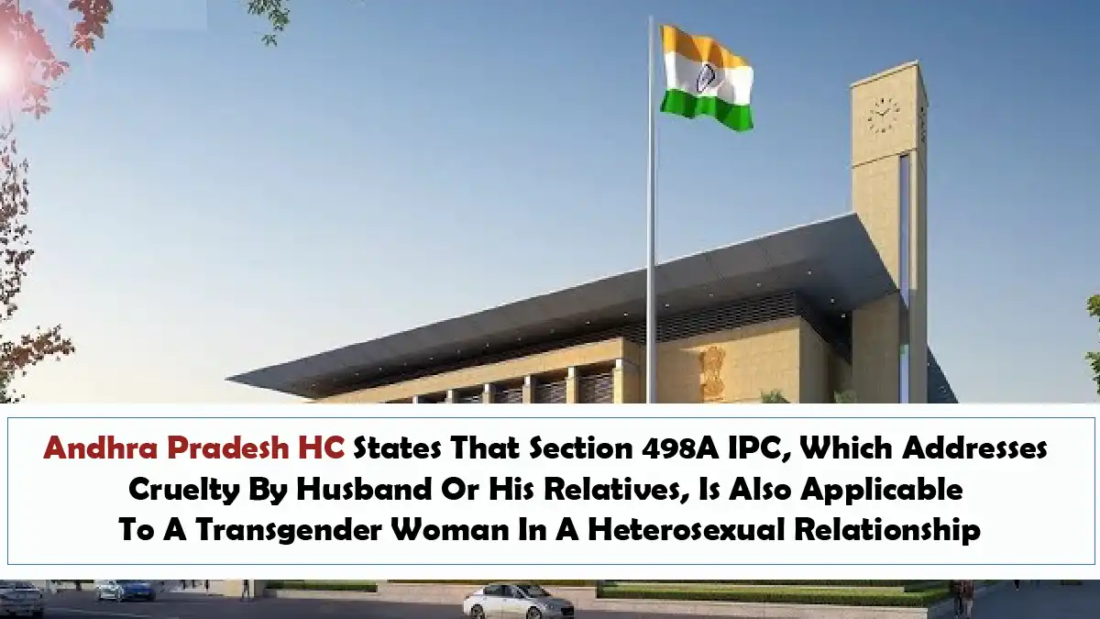Facts of the Case
The case arises from a complaint filed by a transgender woman against her husband and his family members, alleging cruelty and harassment in connection with dowry demands. The complainant stated that the marriage had been solemnised according to Hindu rites by Arya Samaj, and she had obtained a certificate to this effect. She also submitted a medical certificate confirming her gender identity as a transgender woman who identifies as female. Based on her complaint, an FIR was registered under Section 498-A of the Indian Penal Code (IPC) and Section 4 of the Dowry Prohibition Act, 1961. The accused, including her husband, then approached the High Court under Section 482 of the Criminal Procedure Code, seeking to quash the proceedings on the ground that the complainant was not legally a “woman” within the meaning of Section 498-A.
Contentions of the Petitioner
The petitioner contended that the complainant, being a transgender person, did not fall within the definition of “woman” as used in Section 498-A IPC, which is intended to protect women from cruelty in matrimonial relationships. The petitioner also argued that the marriage itself was invalid under personal laws, as it was not a union between a biological man and woman. He relied on the majority opinion in the Supreme Court’s decision in Supriyo v. Union of India (2023), claiming that there was no recognised fundamental right to marry for transgender persons. Based on these assertions, the petitioner requested the High Court to quash the criminal proceedings, as he believed they were not legally sustainable.
Contentions of the Respondent
In response, the complainant maintained that she identified as a woman and had undergone medical procedures confirming her gender identity. She asserted that her marriage was valid under Hindu law, having been solemnised through Arya Samaj rituals, and she had obtained a certificate in support. She further argued that denying her protection under Section 498-A IPC would amount to a violation of her fundamental rights under Articles 14, 15, and 21 of the Constitution of India. She submitted that a transgender woman in a heterosexual marriage should be entitled to the same legal protections against cruelty and dowry harassment as any other woman.
Court’s Observations
The Andhra Pradesh High Court rejected the petitioner’s contention that the complainant was not entitled to invoke Section 498-A IPC. The Court observed that the judgment in NALSA v. Union of India (2014) continued to be good law and had not been overruled by Supriyo. Citing NALSA, the Court stated, “Recognition of one’s gender identity lies at the heart of the fundamental right to dignity.” It also emphasized that gender identity must be respected and protected in line with constitutional guarantees.
The Court noted that “a transgender woman who identifies and lives as a woman is entitled to invoke the protection under Section 498-A IPC if she is in a heterosexual marital relationship.” It rejected the argument that the absence of a District Magistrate’s certificate under the Transgender Persons (Protection of Rights) Act, 2019, could disqualify someone from claiming protection under criminal law. The judgment held, “Self-identification of gender does not depend on any certificate; the right to self-perceived gender identity was upheld in NALSA and continues to be binding.”
However, the Court also scrutinised the allegations in the FIR and found them to be vague and lacking in specific details. It noted that “omnibus and sweeping allegations, without detailing specific acts of cruelty or dowry harassment, do not satisfy the requirement of prima facie evidence to proceed with criminal prosecution.” Therefore, while the Court upheld the complainant’s right to file a complaint under Section 498-A IPC, it questioned the evidentiary sufficiency of the particular allegations in this case.
Court’s Order
The Court concluded that the complaint was legally maintainable, and transgender women in heterosexual marriages are entitled to seek protection under Section 498-A IPC. However, finding that the allegations in the FIR lacked specific and concrete accusations against the accused, the Court held that the continuation of criminal proceedings would constitute an abuse of process. Accordingly, the High Court exercised its powers under Section 482 CrPC and quashed the proceedings against the petitioner and the other accused.
Credits: Adv. Deeksha Rai
 Cart is empty
Cart is empty 

